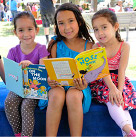The stress of the California wildfires can be overwhelming for children, who cannot understand the chaos. Whether they’re evacuated or simply hearing the sirens and smelling smoke, the experience can create feelings of anxiety and fear in children. Parents and caregivers can help console children with some tips from the National Child Traumatic Stress Network.
Resources in Response to the California Wildfires
In response to the California wildfires, the National Child Traumatic Stress Network has developed resources to help children, families, and communities navigate what they are seeing and hearing, acknowledge their feelings, and find ways to cope together. Resources include:
- Parent Guidelines for Helping Children Impacted by Wildfires (En Español)
- Wildfires: Tips for Parents on Media Coverage (En Español)
- Simple Activities for Children and Adolescents
- Trinka and Sam: The Big Fire – e-book for young children. (En Español)
- Helping Youth After a Community Trauma: Tips for Educators
- Talking to Children: When Scary Things Happen
- Creating Supportive Environments: When Scary Things Happen
- After a Crisis: Helping Young Children Heal
- Age-Related Reactions to a Traumatic Event
- Helping Teens with Traumatic Grief: Tips for Caregivers
- Helping School-Age Children with Traumatic Grief: Tips for Caregivers
- Helping Young Children with Traumatic Grief: Tips for Caregivers
- Once I Was Very Very Scared (En Español) – children’s book for young children
- Pause-Reset-Nourish (PRN) to Promote Wellbeing (En Español) (for responders)
Psychological First Aid and Skills for Psychological Recovery
The NCTSN also has resources for responders on Psychological First Aid (PFA; En Español). PFA is an early intervention to support children, adolescents, adults, and families impacted by these types of events. The PFA Wallet Card provides a quick reminder of the core actions. The PFA online training course is also available on the NCTSN Learning Center. PFA Handouts include:
- Parent Tips for Helping Infants and Toddlers (En Español)
- Parent Tips for Helping Preschoolers (En Español)
- Parent Tips for Helping School-Age Children (En Español)
- Parent Tips for Helping Adolescents (En Español)
- Tips for Adults (En Español)
For community and mental health providers who plan to continue working with affected communities long-term, review Skills for Psychological Recovery (SPR; En Español) and take the SPR Online course.
Resources to Support Firefighters:
The Center for Firefighter Behavioral Health has resources for firefighters, providers supporting them, and their friends and family, including the Helping Heroes web-based training.
Mobile Apps:
- Help Kids Cope
- PFA Mobile
- SAMHSA Behavioral Health Disaster Response App
- Supporting Firefighter Families
- Bounce Back Now (En Español)
Available from the Center for the Study of Traumatic Stress at the Uniformed Services
University and other partners:
- Sustaining the Psychological Well-Being of Caregivers While Caring for Disaster Victims
- Safety, Recovery and Hope after Disaster: Helping Communities and Families Recover
- Leadership Communication: Anticipating and Responding to Stressful Events
- Wildfire Smoke Factsheet: Protecting Children from Wildfire Smoke and Ash
Resources for After the Wildfire:
Disaster Helpline
SAMHSA has a Disaster Distress Helpline – call or text 1-800-985-5990 (for Spanish, press “2”) to be connected to a trained counselor 24/7/365.
Additional resources about what to do during and after the fires can be found here.
Read more on the latest fire information and resources page to stay up to date.


